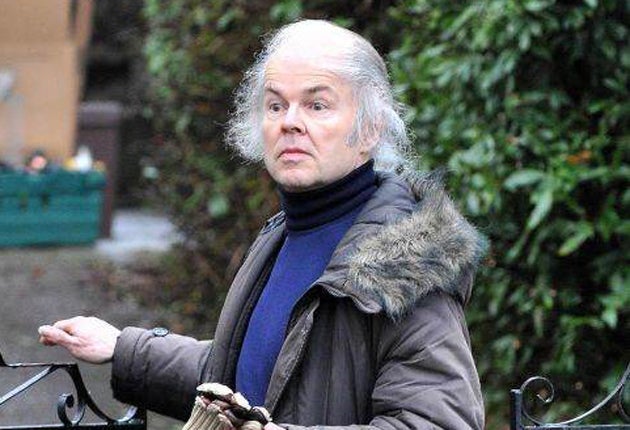Contempt of court case raises difficult issues
Two newspapers are facing charges over their treatment of Joanna Yeates's landlord. Stephen Glover weighs the evidence

Your support helps us to tell the story
From reproductive rights to climate change to Big Tech, The Independent is on the ground when the story is developing. Whether it's investigating the financials of Elon Musk's pro-Trump PAC or producing our latest documentary, 'The A Word', which shines a light on the American women fighting for reproductive rights, we know how important it is to parse out the facts from the messaging.
At such a critical moment in US history, we need reporters on the ground. Your donation allows us to keep sending journalists to speak to both sides of the story.
The Independent is trusted by Americans across the entire political spectrum. And unlike many other quality news outlets, we choose not to lock Americans out of our reporting and analysis with paywalls. We believe quality journalism should be available to everyone, paid for by those who can afford it.
Your support makes all the difference.Less than two weeks after the killing of Joanna Yeates on 17 December last year, her landlord Chris Jefferies was arrested. After a couple of days in custody, he was released on police bail on New Year's Day, though he remained an official suspect until Vincent Tabak was charged with her murder some weeks later.
During his brief incarceration several newspapers went to town, virtually fitting up the former public school teacher as the kind of person one might expect to commit a murder. His blue-rinse hair and reported love of "avant-garde" films were produced as evidence of his supposed oddness. One memorable headline in The Sun read: "Weird, Posh, Lewd, Creepy."
Mr Jefferies was virtually convicted, as I remarked in this newspaper at the time, by journalists who had not understood that by the standards of most public-school teachers of English there was nothing remotely odd about him. If Mr Jefferies had been charged, a jury might well have been swayed by the almost hysterical portrayal of his character.
At the height of the hysteria, on 31 December 2010, the Attorney-General, Dominic Grieve, warned that newspapers must be fair, and not impede the course of justice. Yesterday Mr Grieve was given leave by judges to proceed with a contempt of court action under the Contempt of Court Act 1981 against The Sun and the Daily Mirror in respect of one article in the former publication and two in the latter.
Mr Grieve's action is highly unusual inasmuch as no case involving Mr Jefferies ever came to court. The Attorney-General reasonably contends that the articles might have posed a "substantial risk of serious prejudice" had the former teacher been charged, but there can't be any risk of prejudice because there wasn't any trial with him as a defendant. The two newspapers are being held to account for their alleged misbehaviour which, in the event, had no regrettable judicial consequences, though it doubtless distressed Mr Jefferies. Indeed, he is bringing libel and privacy actions against several titles including The Sun and the Mirror.
I must admit that my own feelings are contradictory. At the time, I strongly felt that Mr Jefferies had been unfairly treated by some newspapers.
He may well have a robust civil case against some or all of them. As a wholly innocent man, he must have been driven half-mad by some of the things that were written about him. I question whether he could have had a fair trial.
But whether it is reasonable to find two newspapers guilty of criminal behaviour in these circumstances I wonder. We will see what happens in court. Mr Grieve will argue that The Sun and the Mirror interfered with the processes of justice.
Maybe they did, but it is hard to define the harm done. I presume his real intention is to warn off these and other newspapers from behaving in such a way in similar cases.
Of course newspapers shouldn't convict a person on their pages. But can The Sun and Mirror themselves be convicted when, despite their coverage, they did no measurable damage to any legal process?
The death of Joanna Yeates
17 December 2010 Joanna Yeates is last seen walking home in Clifton, Bristol.
25 December Her frozen body is found beside a road a couple of miles away. A post-mortem finds that she was strangled.
30 December Police arrest her landlord, Chris Jefferies, on suspicion of murder.
31 December The Attorney-General Dominic Grieve warns newspapers of their obligation to not publish reports about Mr Jefferies that are in contempt of court. Chris Jefferies is released on bail.
20 January 2011 Vincent Tabak, 32, a neighbour, is arrested. Two days later he is charged with Ms Yeates's murder.
7 March 2011 Mr Jefferies is released from police bail without charge.
21 April Mr Jefferies's solicitor says he will sue eight newspapers for their coverage of his arrest.
5 May Mr Tabak admits killing Ms Yeates, pleading guilty to manslaughter but denying murder. His trial is scheduled to begin on 4 October.
Read Stephen Glover's Media Studies column every Monday
Join our commenting forum
Join thought-provoking conversations, follow other Independent readers and see their replies
Comments